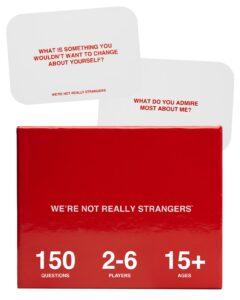We’re Not Really Strangers is a party/social game created by Koreen Odiney, creator and CEO of the We’re Not Really Strangers company. Primarily targeted at young adults around college (or slightly older) age, with an optimal group size of 2-6 players, this game intends to bring players closer together by asking somewhat personal or deep questions, aiming to make the players, as the name suggests, “not really strangers”. The game is played using a custom deck of question cards, which are split into levels based on the level of intimacy that the questions entail, and players take turns drawing cards and answering the questions on them.
The mechanics of We’re Not Really Strangers is incredibly simple; the majority of the mechanics are explained above. In addition, there is a “dig deeper” mechanic that allows a player, once per level, to explore further into another player’s answer for a question. Through these simple mechanics, the game tries to build deeper connections between players, prompt them to be vulnerable with each other, and aid them in exploring and deepening their knowledge of the others. It focuses heavily on fellowship as its form of fun: during my own playthrough with friends, some of the questions we got were questions I would have never asked my friends in a different setting (“What would your younger self not believe about your life today?”, for instance); those kinds of questions helped me learn a lot about what people’s inner thoughts and feelings are – for the question above, we ended up talking about stuff that the person being asked was proud of and things that they always aspired to be or do as a child which came true. To an almost equal game, the game promotes expression as a kind of fun. Though some of the questions are straightforward, a lot of them require at least some level of introspection to answer fully – for instance, the question above is something that, while it might not be a difficult question to answer, at least requires you to think about your past self and synthesize them with how you are today, which isn’t necessarily something you’d do outside the realm of the game.

Our game, Dare to Share, has some major similarities, but also some major differences in comparison to WRNS. Without spending too much time on the mechanics, our game follows a similar card-style drawing system. However, one major difference is that, while WRNS asks more introspective questions, whose answers tell more about the person’s psyche or inner thoughts, Dare to Share focuses a lot more on storytelling, and dredging up moments from a person’s past – especially that the person may not be proud of. This is the first major difference – while WRNS, as discussed above, is heavy on the “expression” and “fellowship” types of fun, Dare to Share shifts the balance much further from “expression” and towards “fellowship” – the prompts (for instance, “Tell the story of your first kiss”) don’t necessarily give players a lot of room for personal introspection outside of “Am I willing to tell this story?” Meanwhile, players learn a lot about each other, similarly to WNRS, but the kinds of things they learn are less emotionally investing and deep, so much as fun, lighthearted, and amusing. Dare to Share also has a point system, in which people can get points for telling good stories or being willing to answer more high-stakes questions in more high-stakes ways (“Act your answer out”, for instance); they can also get points by stealing others’ questions and giving their own answer instead. This adds a challenge type of fun to the game, since now players are racing to get to the point threshold required to win; this challenge is mostly not present in We’re Not Really Strangers, and is one of the things that gives Dare to Share a more casual and lighthearted aesthetic. Arguably, this also adds more introspection to the game, since now players have to think more closely about their past experiences in order to determine what to share and how to share it to maximize points. In this sense, our game shifts closer to WNRS. However, it’s still mainly different, since there are different types of introspection and expression involved. In WNRS, the main form of expression comes in the form of determining what you have taken away from a past or current experience, while in Dare to Share, the expression is mainly determining your level of comfort or daringness with the presented question. Overall, the main similarity between the games is in the fact that players share sometimes guarded information with each other; the aesthetic, tone, and goal of the games otherwise differ, sometimes greatly.




